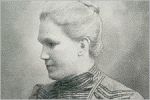Auguste Fickert
Auguste Fickert fought enthusiastically for women’s rights and dedicated much effort in achieving social reforms and political participation.
Additional to her education in public school, Auguste Fickert had private teaching at home. She attended the College for Female Teachers St. Anna in Vienna, and she had also studied English and French – therefore she was able to publish women-specific articles in foreign journals.
Placing high value on quality reporting, she established her reputation as a journalist. She was the editor of a journal entitled „Neues Frauenleben“ [Women’s new life], as well as co-founder of the journal „Dokumente der Frauen“ [Documents of Women] which encountered much interest both in Austria and abroad. However, her main profession was to be a primary school teacher in a school run by the City of Vienna.
Auguste Fickert became known for her protest against changes in the local and regional electoral law. Those changes removed the privilege of some women who priorly were allowed – under certain circumstances – to participate in local elections.
After that she intensified her efforts to promote women’s rights.
In 1893 she founded the „Allgemeinen österreichischen Frauenverein” [General Austrian Women’s Association] which represented the radical wing of the middle-class women’s movement. The members of this association were considered as progressive. They demanded equal political rights for men and women.
She organised the first employments of women in public service and promoted the foundation of women’s professional associations.
Among the targets that Auguste Fickert aimed at where also a reform of the school system, she claimed free-of-charge attendance of schools and legal abolition of forced celibacy in female teachers. The consequences of her criticism regarding the school system were drastic; she had to face disciplinary action and was transferred to another school. Additionally, she was met with hostility for her being unaffiliated with any religion.
Anyway, she would not let herself dissuade from her claims and continued to advocate major opportunities for education and work of young girls and women. She took an active share in the foundation of an association dedicated to female workers‘ education („Arbeiterinnen-Bildungsverein“) and vehemently supported the idea of giving women access to university studies.
In order to ensure economic independence of women, she emphasized the necessity of „Equal Pay for Equal work” and fought for a betterment of women’s position in terms of family law, as at that time they had nor rights nor freedom. She placed special emphasis on current social issues, such as rights for servants and house maids, she claimed maternity protection and took position against marriages for maintainance and prostitution.
She organised discussion groups and assemblies, and she herself gave lectures. Thanks to her strong self-confidence she was able to convince others of her ideas, thus contributing a lot to reduce barriers between the social classes und to increase awareness for political issues in women.
In 1895 she founded an association for legal aid aimed at supporting women with no financial means.
She wanted to provide housing for unmarried working women and to facilitate their daily life routines. Thanks to her efforts, the Construction and Settlement Cooperative „Heimhof“ was built up which featured a central kitchen, a library and a common living room to be shared by all inhabitants.
She was always purposeful, determined and very courageous in making her claims known to the public. Invigorated by her believe than mankind would make progress, she dedicated herself to those who were not able to participate, and devoted the work of her lifetime to better women’s living conditions.
Auguste Fickert can doubtlessly be considered a pioneer and a leading campaigner of the women’s rights movement.
To prevent her work from vanishing in oblivion, the sculptor Franz Seifert designed a monument for her, which was erected in Türkenschanzpark [a huge park in Vienna] with the following inscription placed on it:
„Full of courage and spirit, she has dedicated her life to high ideals“
Sources
- http://www.onb.ac.at/ariadne/vfb/bio fickert.htm
- http://www.dasrotewien.at/fickert-auguste.html
- http://bedeutende-frauen.webnode.at/auguste-fickert/
Photocredits: Auguste Fickert on the occasion of the unveiling of her monument on 22.06.1929, Author unknown.
Source: Picture Archive ONB with friendly permission of ONB (Austrian National Library) of 20.01.2014
http://www.fraueninbewegung.onb.ac.at/Pages/PersonDetail.aspx?p_iPersonenID=11257304




